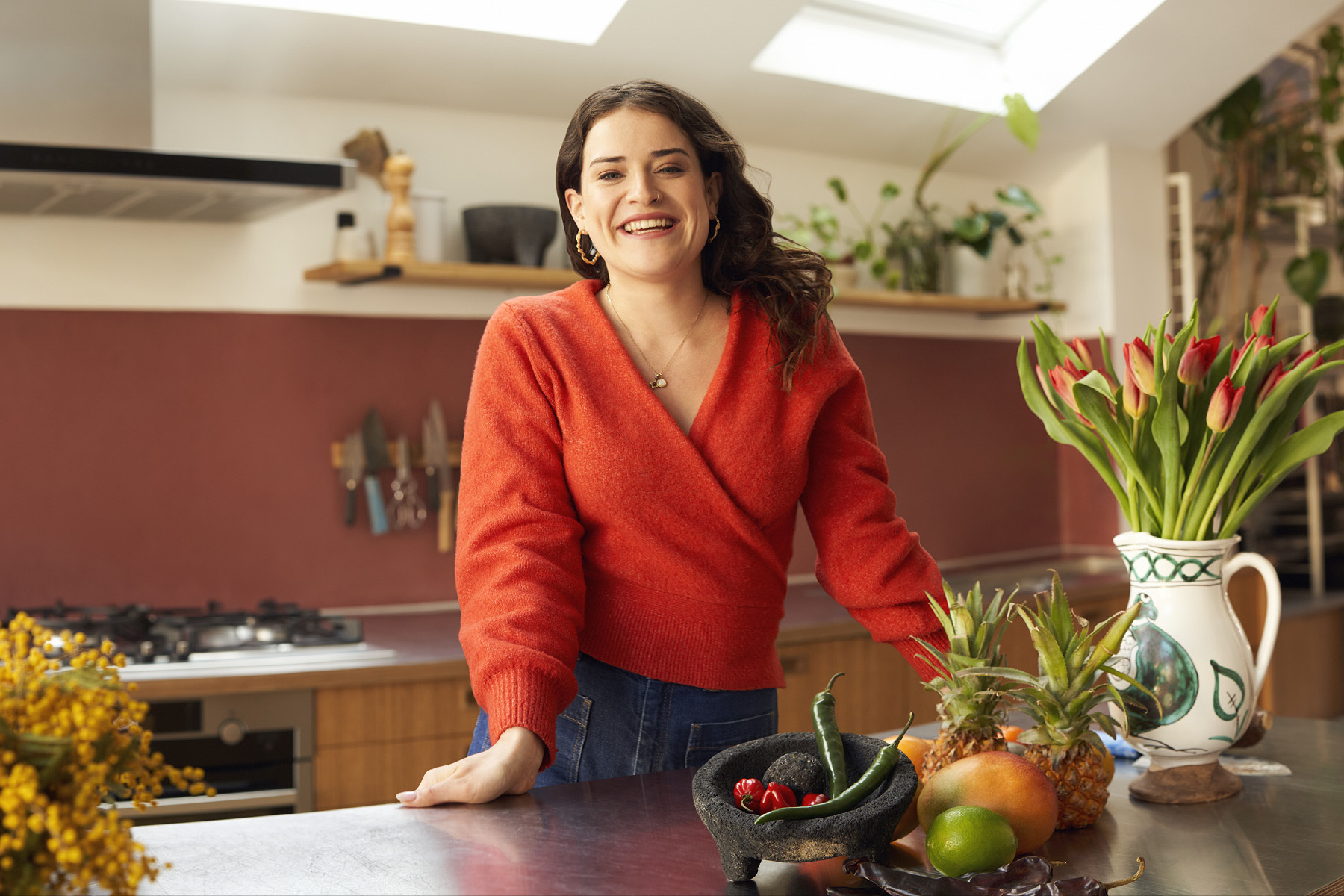
Ixta Belfrage found out she would be writing her own cookery book from Yotam Ottolenghi, over a simple dinner of soup and red wine. She responded with tears.
“We were doing a lockdown event for Flavour [the bestselling Ottolenghi cookbook that Belfrage co-wrote] from his house, and he asked me to stay for dinner afterwards,” she explains, resting her cutlery on her plate during a sprawling lunch. “And he basically told me that the publishers had spoken to him and asked if they could approach me to write a book.
“Yotam said, ‘I want you to know that I give you my blessing. So you should be hearing from them in the next week or so.’”
“I felt so overwhelmed,” she recalls, eyebrows raised above her dark brown eyes, “that I said to him: ‘Can I stay at the test kitchen and go down to a few days a week?’ and he said, ‘No, Ixta. If you’re going to do your own thing, you just do it. It was really bittersweet. I did want to do my own book, and I did want to leave to do my own thing, but I didn’t think it was going to happen like that.”
The resulting cookbook, Mezcla – a comprehensive and colourful introduction to Belfrage’s distinct culinary approach – is the kind of deserved happenstance that has defined the 31-year-old chef’s career. She only worked in a professional kitchen after emigrating to Australia and back, dropping out of university, running a gluten-free, sugar-free, joy-free food pop-up and then, eventually, landing a commis chef test shift at Nopi because – to quote the person hiring – “they were desperate”. Belfrage walked into Ottolenghi’s Soho restaurant without realising that the household name chef was behind it.
Ten miserable months passed – “I spent a lot of time crying in the walk-in fridge,” she says – when, just as Belfrage was “on the verge of quitting”, a role at the test kitchen came up. “I’d never heard of a ‘test kitchen’, I’d no idea the idea that recipe development was even a job,” she explains. She also didn’t realise that she’d been training for the gig – making up recipes and inventing new ways with food – since she was a child.
While her recipes may be bold – the bright orange-and-pink cover of Mezcla feels deeply appropriate – Belfrage has been making her way into our kitchens by stealth for years. Aside from co-writing Flavour, you may have encountered Belfrage when she borrowed Meera Sodha’s coveted vegan recipe column in The Guardian, or through takeovers everywhere from in-the-know East London restaurants to Latitude festival. Years of documenting candid behind-the-scenes shots from the Ottolenghi Test Kitchen (or "TK") have amassed Belfrage more than 100,000 Instagram followers. For many of her fans, Mezcla couldn’t have come at a better time.
In the days before I meet the chef and author, and during the days after, I am recommended one of her recipes by three separate people. It’s incredible, I’m told. Then a text message pops up, making a fourth: “She really does make a cracking butternut orzo.”
The recipe in question is a creamy saffron orzo with roast butternut and scotch bonnet, and could be seen as a classic of the Belfrage form: a bold and happy collision of culinary cultures (orzo from Italy; scotch bonnets from Jamaica; Japanese miso and coconut milk from southeast Asia) brewed up into something indulgent, comforting and unexpected. It’s not among the 100 delectable recipes in Mezcla, but it could have been.
We meet over small plates at Brawn, a laid-back but highly admired restaurant tucked into the side of Columbia Road in East London – Belfrage’s choice. Late spring sunlight splinters onto the bare floorboards. Behind our table sit a group of women wearing voluminous dresses with small dogs perched on their laps. Belfrage is the kind of person who greets you with a grip of a hug. Her hair hangs wet over her shoulders. “I’ve just had a shower,” she grins, when I say she’s looking fresh. Gold chains tangle around her neck.
'I've lived in in London most of my life, but I don't really feel at home here.'
Ixta Belfrage
It's easy to believe Belfrage might follow in Ottolenghi’s footsteps in bringing new flavours to British home cooking. There’s a buzz around her recipes; a newness to her combination of ingredients and flavours (sweet and sour celery salad, cassava gratin with onion and caraway farofa, ricotta dip with hot sauce butter pine nuts).
I encourage her to order for the both of us. After rattling through the menu, Belfrage explains how working on Mezcla was a different beast entirely to “dream project” Flavour. “I really wanted to do my own thing,” she says. “And I really wanted it to be about my experience growing up and about those three countries that have shaped me. I don't really know anyone else who's cooking Brazilian, Mexican and Italian fusion food.” Mezcla – “mix” in Spanish, one of the four languages she speaks – is a book born of Belfrage’s heritage.
“I've lived in in London most of my life, but I don't really feel at home here. I sound English, but I don't really feel very English,” she explains. The daughter of a Brazilian raised in Cuba, and a British-American raised in Mexico, Belfrage moved with her family to Italy aged three due to her father’s job in the wine industry. “I basically grew up around some seriously incredible Italian food,” she remembers. “My first love was pasta and ragu, chicken liver, fried sage, fried rabbit.”
Belfrage traces her upbringing through some of Mezcla’s most prominent ingredients. Her mother was “obsessed” with plantain: “She grew up eating them alongside pretty much every meal,” Belfrage writes, “and brought my sister and me up in the same way, so now my fruit bowl is almost never without a couple of blackening plantains.” But Belfrage largely taught herself to cook; raised by a mother who prioritised eating healthily, Belfrage rebelled, and would “get really upset about how boring the food was. I remember her saying, ‘You know, if you want nice food, you just have to make it yourself.’”
I ask how old she was. “Four? Five?” she replies, laughing, before whipping out photo evidence: tiny little Ixta, barely larger than the wooden spoon she’s holding, perched next to a pan on the hob with a serious sideways glance to the lens. She sought guidance from the family of her best friend, who ran the kind of restaurant in Tuscany where “the granddad would make all the pasta in the laundry room of their house. I would just hang around and watch her.” But Belfrage also says that it’s just in her, this appetite for making taste and flavour: “It’s the one thing that comes naturally to me.”
Still, a career in food was something of a last resort. Belfrage moved to Australia, where she “sold power and gas door-to-door” before working as a travel agent, something she loathed. It was, she admits, “a very weird time in [her] life”. An abandoned graphic design degree proved to be breaking point. “My sister literally just said to me, ‘Why the fuck aren’t you a chef?’ And it was like, “Okay, we’ll try that.’”
The food arrives: elegantly dressed plates of cured meat, cod, and beans jostle for room on the table alongside a rich, cool vichyssoise that Belfrage dunks everything in and which neither of us remember ordering – a silent acknowledgement that Belfrage is the kind of chef other chefs want to treat well.
She has never trained as a chef (“People often assume I know how to cook everything, but I don’t know. I just make it up as I go along more often enough”) but ended up at Nopi after applying for 130 junior roles in London’s kitchens in one feverish night. Belfrage is keen to puncture the misbelief that she was personally cherrypicked for greatness by Ottolenghi – or ‘Big Y’, as she and her former colleagues know him – something that could be construed by her co-writing Flavour and rising through the ranks of his restaurants.
She landed the test kitchen job “pretty much straight away”, but crucially, Ottolenghi wasn’t there when she did. “It was basically just a case of being in the right place at the right time,” she says, as a plate of pasta arrives on the table, “and not having quit.” Thank goodness she didn’t.
